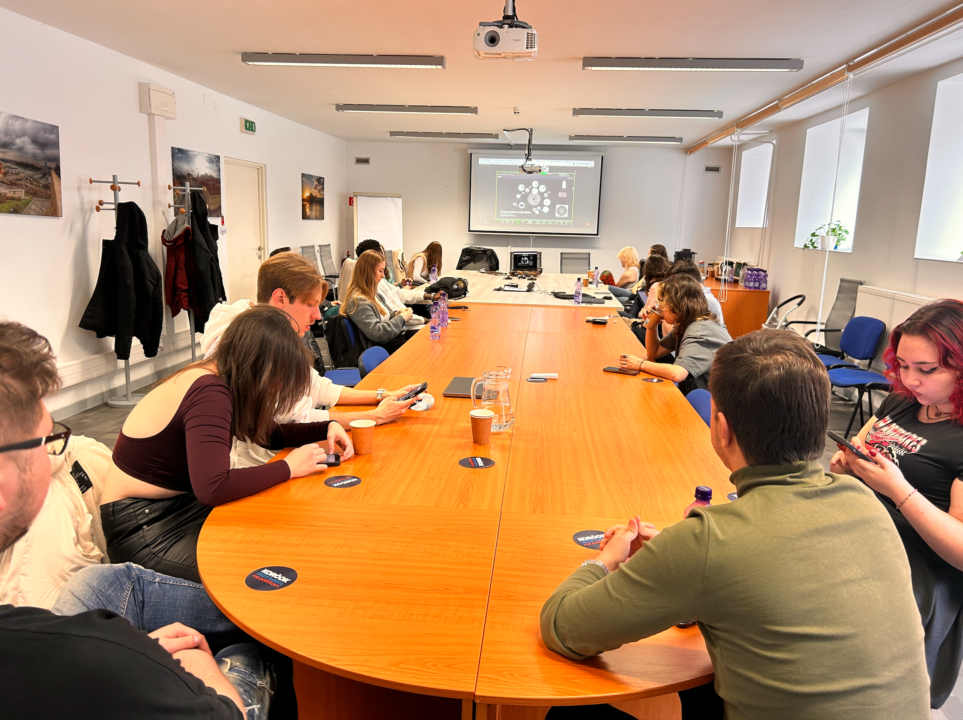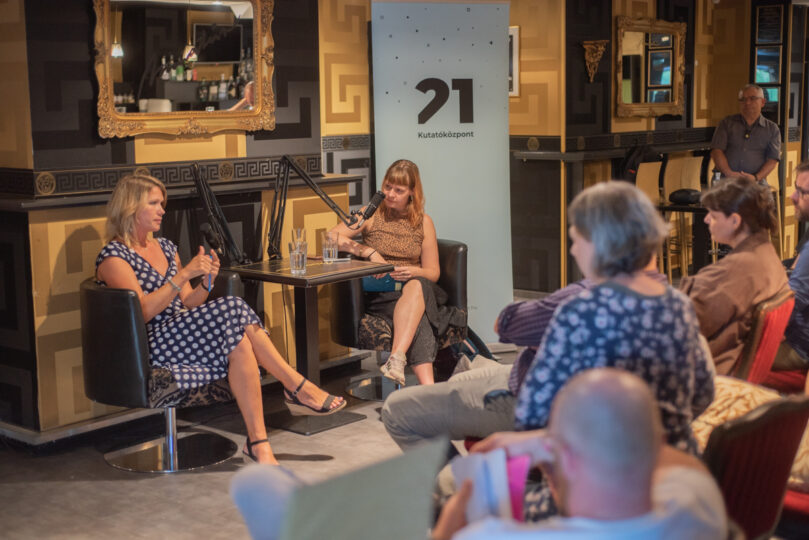Interactive podcasts
During the project´s events phase, the 4 consortium members organised a series of live discussions, that were also published as podcasts to ensure reach to a wide set of audience.
Slovakia
As part of the project, two interactive podcasts were held in Bratislava, focusing on key topics and findings of the project. They were both conducted in English, because the events welcomed international participants and fostered a broader dialogue.
The first podcast on the topic of migration, was recorded during a live event on March 22, 2024 with more than 15 participants present. Facilitated by BPI senior researcher Ingrid Borarosova, this podcast explored analysis and citizen´s consultations on migration in Central European countries. The session offered insights into public perceptions and attitudes, providing a different understanding of migration dynamics in the region.
The second podcast on the topic of Fake News and Current Political Developments in CEE was recorded on March 27, 2024. This podcast, led by BPI senior researcher Viera Žúborová, addressed the current political and societal developments in the CEE region. It covered the rise of conspiracy theories and the impact of fake news on issues like migration, the rule of law, and climate change. Viera participated online while the audience of 12 people gathered on-site.
In both podcasts, hosts presented significant findings from the RevivEU project’s public opinion polls and analyses, allowing participants to engage and ask questions. Participants were particularly interested in understanding migration dynamics and the influence of fake news on societal beliefs and political trends. These interactive podcasts provided comprehensive insights into critical issues affecting Central Europe, fostering fruitful dialogue among participants. They highlighted the importance of informed perspectives on migration and the impact of fake news, contributing to a deeper understanding of these complex topics.

Poland
Two interactive podcasts were recorded in late May (on 28th and 29th of May) in Warsaw, in Państwomiasto, the social and cultural hub run by Projekt: Polska. Both were recorded with live audience of 16 people altogether, who actively participated asking questions and commenting on the given topic. Each podcast meeting started (before the recording) with a presentation of RevivEU for the audience. The recorded parts began with an introductory conversation between a host and an expert, followed by open conversation with the audience. The pretext of creating the podcast were three events: celebration of 20th anniversary of Polish membership in the EU, upcoming EP elections and approaching Polish presidency in the Council of the EU.
The first podcast was moderated by dr Milosz Hodun, president of Projekt: Polska Foundation, and featured Joanna Burnos, member of Team Europe Direct and founder of the Leaderis Institute. Joanna Burnos focused on the area of the rule of law and women’s rights. She presented the biggest accomplishments of the EU in promoting equality, for instance in education, politics and business. She commented on the most important EU directives, giving real-life examples of how they change life of Polish and European women. The free discussion with the audience stared with some participants sharing their first associations with the EU, and their experience with EU programmes, e.g. Erasmus. Unexpectedly, a part of the discussion between the guest-experts and the audience was about the changes in the countryside in last 20 years, as two participants appeared to be knowledgeable in this area (a professor from the Academy of Science, and member of the farmers’ coop).
The second podcast was moderated by Alicja Jakimko, law student and political activist, and feature professor Bartłomiej Nowak from the Vistula University, member of Team Europe Direct. This podcast was deliberately dedicated to the topic of the EU and youth. All members of the audience were young, 18-25.
The podcast was a new format for Projekt: Polska. Even though recording it with the audience posed a challenged, the overall experience was very good and the outcome was satisfactory. It was decided that more such podcasts will be recorded to familiarize target groups of the foundation with EU policies.

Hungary
Both podcasts by the 21 Research Center were recorded during live events on 7th of September 2023, at a popular meeting place Miniatűr.
The first podcast recording on the topic of democracy and rule of law saw presentations and speeches by Dániel Róna, director of the 21 Research Center and Ábel Bojár, research director of the 21 Research Center.They talked about democracy´s absence in Hungary and what the current system is like. Illiberal democracy? Authority-based system? A semi-authoritarian or maybe a hybrid arrangement? Mafia state? There is no broad agreement in the Hungarian public discourse on the exact description of the Orbán system. Dániel Róna agreed with Sergej Guryev and Daniel Treisman, who say that this regime is not actually democratic, but a “spin dictatorship” and works similarly in Singapore, Kazakhstan and partly in Poland. During the conversation, the following institutions were highlighted, which show why there is no democracy in Hungary: “Free and fair elections; Party competition beyond elections, distribution of resources among political actors, various co-optation tactics (i.e., making political rivals interested in maintaining power) by the ruling party; Existence or absence of independent institutions; Media relations; Independence of the judiciary; Public funds, corruption, construction and transparency of an economic moon court; and Individual freedoms (including primarily the protection of minorities)”
According to Róna, the system can only be dismantled if the voters make sacrifices, if a part of them does not have their free time and existential security in mind, but the dismantling of the system: demonstrations, signatures, protests, strikes. But why does any opposition expect the voter to protest and make sacrifices if he himself, who lives in much better existential conditions, does not do so? But there is also a coordination problem, from which not only the opposition parties, but also those with oppositional sentiments suffer: there would be a demand for a demonstration, angry voters would protest, but there is no organization, party or movement that would organize the masses. According to Bojár, there is another theory that is less sympathetic to him: that due to the peculiarities of modern history, there is no protest culture in Hungary, individual interests are placed above collective interests.
After the 30 minutes long discussion we asked the audience of 15 participants to get involved with their questions. Their main focus was the role of opposition parties and their expectations of them. They also tried to find an appropriate Hungarian translation for the ‘spin’ dictatorship expression. Many participants shared their opinion about the system and tried to find a solution that would change it.
The second of the podcasts was aimed at the topic of climate change. During the first 30 minutes Dóra Csernus climate policy expert at the Equilibrium Institute and Kata Kiss, analyst of the 21 Research Center sought to answer questions like “We are increasingly aware of climate change and its consequences, but how aware are we of what climate policy means?; What do the European Union climate targets cover?; What challenges do the V4 countries have to face during their climate strategy decisions?; and How does the post-socialist past affect our energy management?”
Dóra spoke about the UN goals and the Paris Agreement. And how the EU incorporated these goals into legislation and what short-term and long-term goals they set for achieving them. It was also discussed why the region has achieved its goals well so far. We are not good at measures, but we are good at numbers, this is possible because our heavy industry collapsed in 1990. The EU’s 2020 goals did not cause much difficulty, we did not have to make a great effort to achieve them, but now we have reached a stage where we have to take measures that affect us as well. Dóra and Kata addressed one of Hungary’s main problems, the improvement of which could bring the country closer to achieving its climate goals, which is the energetic renovation of bad buildings. In Hungary, about 30% of final energy consumption and about 40% of greenhouse gas emissions are related to buildings. The renovation of buildings is key, the technology for this already exists (replacing doors and windows, insulation, etc.), but it is difficult to implement due to limited resources. In addition, of course, the regulation of new constructions cannot be neglected either.
Following the discussion with Dóra the 16 participants engaged in a very vivid discussion confronting different ideas and opinions exceeding our time booked at the venue. Many of them asked for more information of the topic. The participants were most interested in how communication could be improved so that people could see how the seriousness of the climate situation affects their everyday life. During the Q&A it was also mentioned that before covid there were at least efforts to draw attention to climate change through demonstrations, but these slowly disappeared.


Czechia
The recordings of the Czech podcasts took place in the last days of May 2024 and addressed the most pressing topics of the ongoing campaign to the European elections. The podcats were recorded during live events, with an audience of 29 guests, and were published as episodes of EUROPEUM´s ongoing podcast series “Talking Europe(um)”, which traditionally dealt in depth with various questions of European and Czech politics.
The first podcast, recorded on 22.5., aimed at the topic of migration – a recurrent topic of Czech olitics and any election campaign. Zuzana Pavelková from Organizace pro pomoc uprchlíkům (Organization for help to refugees) and Viktor Daněk, deputy director at EUROPEUM and former EU journalist, talked first about the migration crises of 2015, what repercussions this left on the citizens´ attitudes and public discourse. They then moved to the current policy environment both in EU and Czechia; they touched upon the aftermath of the recently passed EU Pact on migration and asylum on the policy and campaign.
In the following discussion the 7 participants were interested in the current data – since the topic of migration is so prevalent in the Czech politics, does the data and numbers of asylum/refugees support this? Naturally, the guests were also interested in the effect of migration from Ukraine, given the high numbers of Ukrainians in Czechia, but also tendency to be more welcoming to a seemingly close culture.
The second podcast was recorded during an event with 22 participants on 29.5. and touched upon the economic situation in Europe and Czechia, where we´re headed but also what the citizens think about it. Martin Buchtík, director of STEM, the empirical research agency, focused on citizens´ perceptions of how the economy has been doing since the Velvet revolution, how they see their own domestic economic situations and then explained how much the fact how people are doing economically is connected to their political opinions, the parties they support, view of the EU and also vulnerability against populistic solutions and discourse. Petr Janský, economist and researcher at the Charles University added more economic and geopolitical outlook to this, along with the fact that while people tend to blame the EU for not helping them in harder times, it´s the national member states´ social policies that are supposed to solve that and we see that the long-term sustainability of public finances is worsening, pointing to dangerous times in the future. EUROPEUM´s Klára Votavová then added more EU background information to the discussion, along with the findings of the RevivEU project. The following discussion with participants than moved to the EU´s competitiveness and the role of China as the main competition, along with the possible shift of EU´s stands to industrial policies in an effort to focus more on the companies and business, one of the central topics of the pre-EU election campaign.


